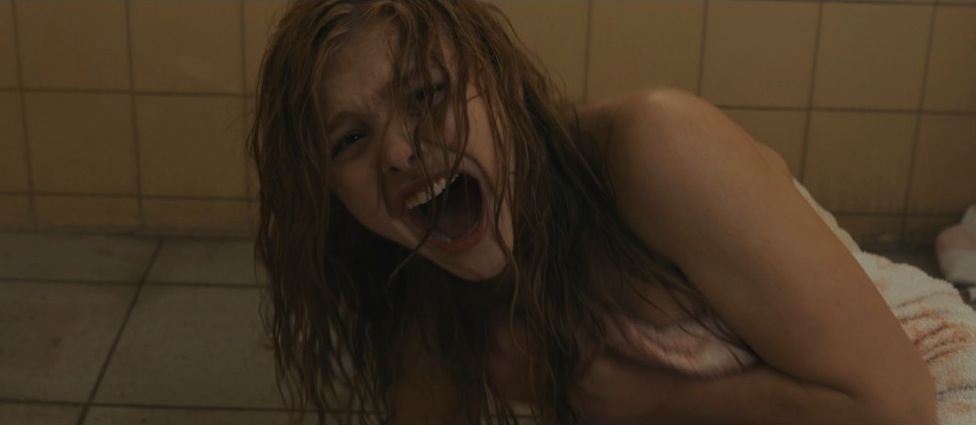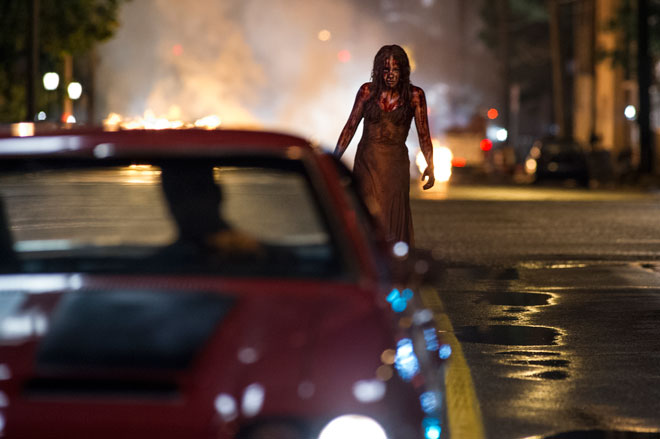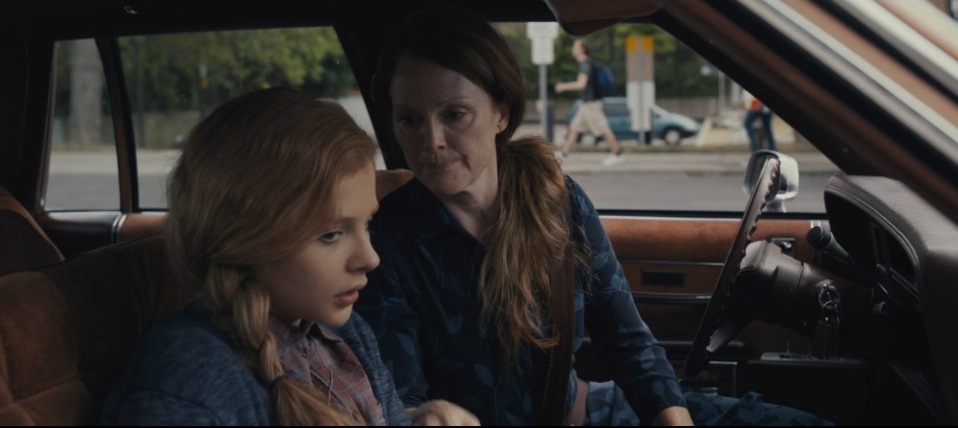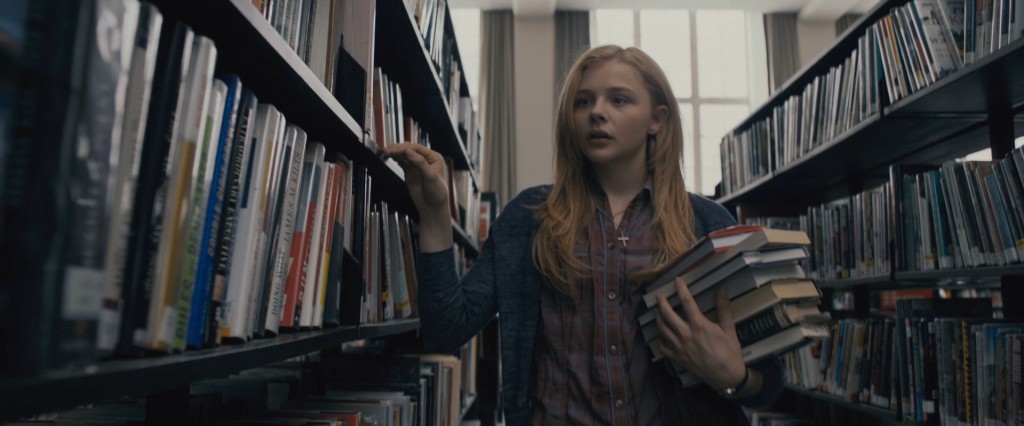review by Australian extraordinaire Ben McEachen
“Carrie had some sort of power. But she was just like me… like any of you, she had hopes, she had fears, but we pushed her. And you can only push someone so far before they break.”
Go ahead. Groan. Roll your eyes. Sneer. Feel better now? You’ve made your point about how unoriginal and predictable it is that a new horror film isn’t all that new.
Carrie is another ‘re-imagining’ of an existing horror film – for a new generation! Yes, that’s code for: ‘come see our needless version of an older movie’. Apparently, movie manufacturers believe we have no access to anything released before this year, and are thus committed to ripping off the past and selling it to the future.

And why wouldn’t they? People continue to macabrely love being scared from the safety of their seat, yet it’s not compulsory to find fresh ways to provoke fear. Like the neverending sequels in horror franchises, horror remakes prove audiences don’t demand something completely different. Rather, just rob the grave of a former fear-monger, and ignore accusations of being starved of ideas.
The original Carrie (1976) was the first Stephen King composition to be movie-fied. Starring Sissy Spacek in the titular role, Carrie was a memorable combustion of teen turmoil, religious abuse and explosive vengeance. Despite the passing of almost four decades, you’ll struggle to name a better portrait of how horrific high school can be.
What Boys Don’t Cry director Kimberley Peirce felt she would or could add to Brian De Palma’s original isn’t forcefully apparent. Distinct personality is Carrie‘s biggest deficiency, as Peirce is unable to resurrect these folkloric characters and events beyond sincere imitation. What eventuates is sturdy, engaging, and other polite terms for ‘could have been worse, given it’s a remake’. Mercifully, the gore factor hasn’t been supersized for our desensitized times, nor has the sexual content gone wild.
The not-so-original Carrie stars Chloe Grace Moretz as the harassed oddball. Sticking closely to its source, the update again uses an awful episode of locker-room humiliation as its plot trigger. From here, ripple effects set Carrie on a volatile course to Prom. Before the big night, the sympathetic misfit must navigate her mother’s domineering/demented beliefs and the ever-present possibility of being humiliated.
With Carrie’s telekinetic abilities increasing as she stands up to her Bible-bashing mama (Exhibit A: Mommie Dearest hits Carrie with God’s Word), a simultaneous scheme of public embarrassment is ramped up. The blood-soaked finale flows from the touching formulation of a mistreated girl finally enjoying life. Becoming less ‘hire-a-weirdo’ as the story unfolds, Moretz sells well the fleeting moments of Carrie being treated with decency. Pity the ensuing carnage bleeds out, as rote spectacle and silly sequencing smother the flames of rage.
While the overall production is of limited impact, it does reveal sad but notable truths which continue to carry real-world weight. Carrie remains an indictment upon bullying – offset by a commendable act of teen selflessness – yet there is another abusive element which stretches beyond the schoolyard and into the soul.
Carrie raises hellish fury in the final scenes – windscreen face-plants; cars levitated into petrol stations – but the bit that sticks with you is how destructive religion can be, when it’s practiced badly. Although Carrie’s mother Margaret (Julianne Moore) is more of an extreme Christian cartoon character than previously, the sting of her fire-and-brimstone convictions still cuts deeply through the ham and cheese of Moore’s histrionics.
The damage done by religious authority figures is a lamentable reality. Christianity shares in this regrettable history; from ministers to parents, authority figures have abused or traumatised children. Margaret’s bug-eyed fixation upon judgment, punishment, and fearful prayers is a shocking example of distorting elements of Christianity and ignoring others.
Margaret White: “Help this little girl who’s sinned in her days and ways, if she’d made innocent the curse of blood would not be brought upon her…”
Carrie White: “Mama that’s not even in the Bible, it doesn’t say that anywhere.”
Indeed, when Margaret again lectures Carrie that the ‘original sin’ was sexual intercourse, she has to tell her shut-in mother that her Bible says no such thing. Carrie’s right. She then quotes an actual Bible verse, the opening line of Psalm 136 – ‘Give thanks to the Lord, for he is good. His love endures forever’. Carrie’s subtle demonstration of why it pays to learn Christian truths from the source is a movie reminder about how some kids have to battle hard to withstand their parents’ flawed, or corrupted, beliefs.
The film also shows the difference between Carrie and Margaret’s view of God and Jesus. Margaret’s entire outlook is clouded by the stain of sin, and its horrendous consequences. Her desire to keep her daughter pure may be admirable…. but her methods are cruel and heartless. Carrie is locked in a tiny room, and commanded to beg God for forgiveness – for stuff she hasn’t even done. Despite the copious crucifixes and tacky paintings of Jesus in their home, Margaret appears to not understand how sin has been dealt with by the divine man hanging on a cross, on her very own walls. Does this sound familiar to anyone?
Carrie: “I have to try and be a whole person before it’s to late.”
Incredibly, considering her mother’s destructive inaccuracies, Carrie recognises the love, mercy and grace which God has afforded people. The movie barely explores the teen’s grasp on religious beliefs, yet her respectful, earnest appeal to Margaret about ‘the Lord’ suggests Carrie knows more than her mother. Hopefully, the error of Margaret’s ways will cause many to reconsider how they live out their religious authority, especially the impact they have on those in their care.






